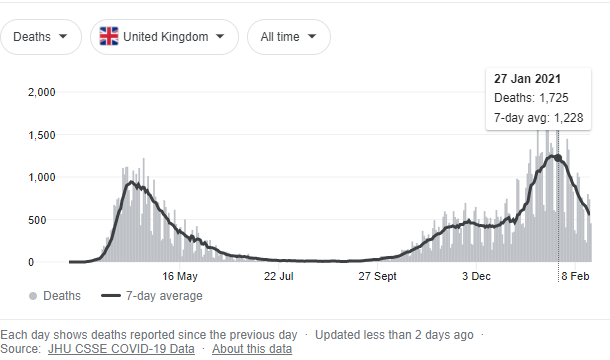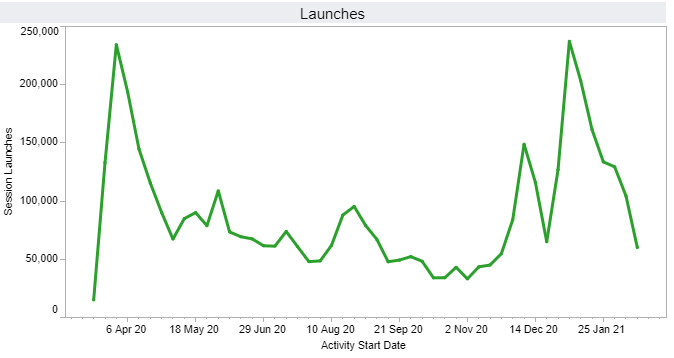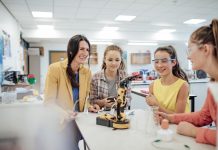Alex Drinkall, Communications and Stakeholder Lead, and Martin Sinclair, Programme Lead at Health Education England e-Learning for Healthcare, educate us about the digital learning transformation programme
As the enormity of COVID-19 was emerging within the UK, the focus for Health Education England e-Learning for Healthcare (HEE e-LfH) was on the provision of education and training for the workforce on the frontline responding to the pandemic.
Although much of the training for the NHS workforce is online there is still a lot of face to face training, which was immediately redundant given the challenging situation. This required the team to work at pace to ensure the individuals supporting the effort could quickly access the information they needed to provide evidence-based high-quality care.
As the need across the NHS was identified, it became clear HEE e-LfH had the power and skills to deliver the educational requirements and the COVID-19 programme was created.
A clinical reference group – made up of a range of clinicians with experience of different specialities, settings and workforce needs, chaired by Dr Ed Hammond, Consultant Anaesthetist – was mobilised very quickly and worked effectively by allocating resources to the most relevant clinical colleague and agreeing wherein the programme’s hierarchy the resource should be positioned. One of the key challenges was to decide which content was important for staff working in a new setting, perhaps coming with different skills, due to redeployment. The clinical reference group’s diverse make-up allowed this potentially overwhelming task to be completed confidently and efficiently to provide relevant resources to the responding workforce. Convening the clinical reference group provided clinical credibility and direction to the activity of the e-LfH team.
The design of the digital learning transformation programme
The COVID e-learning programme was built on the premise of getting learning resources to the people who needed them, with as few barriers as possible. As well as removing the requirement for users to register or log in; recognising the immediacy and urgency with which information would be needed, without the additional layer of passwords, free access was enabled for the entire health and care workforce in the UK regardless of their employer.
This was an important decision for the provision of support to trainees and alumni who work in social care settings.
Global access
Free access was also extended to healthcare colleagues working around the world via the eIntegrity platform – a partnership between HEE and the Royal Medical Colleges – and to date the resources have been used in 130 countries. This is ground-breaking because colleagues working in other countries usually pay a licence to access the e-learning content, but it was clear HEE should step in and support all involved in combating the global healthcare crisis by providing resources free of charge.
The main objective of the creation of the COVID-19 e-learning programme was to ensure colleagues responding to the pandemic, including allied health professionals, colleagues returning from retirement, third-year student nurses and medical students graduating early and other health and care staff being redeployed into different settings and job roles could quickly access the education and training resources they needed to provide high quality care for the people of the UK.
As well as ensuring that the workforce who were directly responding to patients affected by the pandemic had the training resources they needed, there was also a need to support healthcare professionals working in non-COVID-19 settings, such as GP surgeries, to be able to continue their work despite the challenging situation.
Digital training resources were developed in just three days to support GPs providing remote consultations via telephone and video. This is an example of how clinical practice underwent digital transformation almost overnight and how education and training were required to support this change.
The requirement of education and training resources for the workforce was vast due to the changes to the workforce. Content was required for existing health and care professionals who were redeployed to a different location or speciality, those recently retired or leavers of the service who returned to support the effort and those who were redeployed from another sector who were brought in to provide appropriate transferable skills, such as cabin crew.
All these different groups had different levels of existing knowledge, but all needed to access learning resources that were relevant to their skill set to adequately equip them to do their “new” job.
Summary
From the programme’s launch in March 2020 to date there have been 4.35million session launches of the COVID-19 e-learning programme.
COVID-19 has very much become business as usual for the NHS and across the wider health and care sector. The e-LfH COVID-19 programme is still being accessed, demonstrating the impact the programme had at the height of the pandemic and almost 12 months on since the UK was first locked down.
The e-LfH COVID-19 programme became the central place for the workforce to access education and training resources to support the response to the pandemic.
Its success was unimaginable and exceeded any expectations. The e-LfH team will always be very proud to have played our part in responding to the global pandemic.
Access the programme via our website.
COVID-19 vaccination programme
e-LfH worked in partnership with Public Health England and NHS England and NHS Improvement to develop the COVID-19 Vaccination e-learning programme. The resource is designed to provide the health and care workforce involved in the national COVID-19 vaccination programme with the knowledge they need to confidently promote high uptake of the vaccine and deliver the vaccine programme effectively.
This e-learning programme provides theoretical training. Practical training in vaccine administration, and assessment and sign-off competency is also required before administering the COVID-19 vaccine.
Additional, complementary, e-learning sessions including basic life support, anaphylaxis and statutory and mandatory training are available to support vaccinators’ training and education.
For more information about the COVID-19 Vaccination programme, including details on how to access it, visit the e-LfH website.
To date, there have been 2million session launches of the COVID-19 vaccination programme.
Please note: This is a commercial profile













